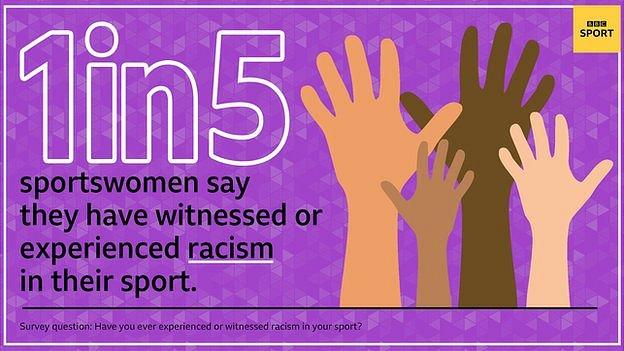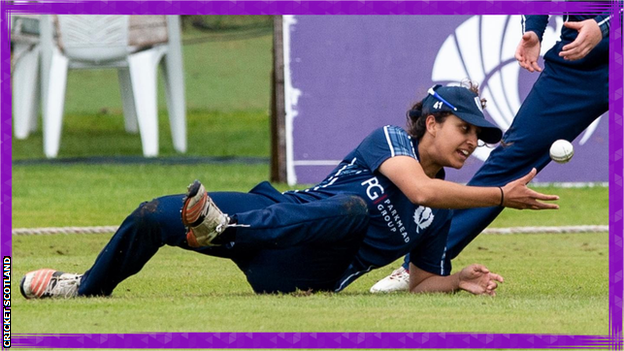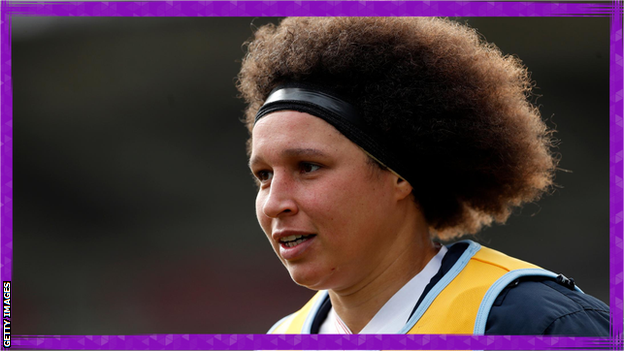BBC Women's Sport Survey: How racism affects female athletes
- Published

"It's the surprise in people's faces when they realise that you're slightly brown and you play for England."
Whether it is structural or spoken, overt or whispered, racism is present in society and sport.
Of the 537 BBC Elite British Sportswomen's Survey respondents, 20% said they had experienced or witnessed racism within their sport.
Here, they tell their stories.

Scotland cricketer Priyanaz Chatterji is tired of having to constantly justify where she's from.
"'Where are you from? But where are you actually from?'
"That is an example of a micro-aggression. Every single brown, black and other minority ethnic person in this country has been asked that question so many times.
"My first answer will always be: 'I'm from Scotland.' And then they ask: 'Oh, where are you really from?' 'Dundee.' And then again: Where are you really from?' And I'll say the town.
"I remember a time in Australia when I had gone to an outdoor cinema with a friend. We met up with some of their friends and that was the first thing they asked me; where are you from? Then their next question was: 'Where are your parents from?' I say India and Pakistan, and then I asked them the same thing. And they, as white Australians, were so shocked. Obviously no-one had ever asked them that before. But why do they think it's OK to ask where my parents are from?
"It's this idea that you, as a white person, are the default; you are the norm and anyone who deviates from that has to be justified and explained. Does that really have to be the first question you ask me? And why is my answer of Scotland so often challenged? I was born here. I grew up here. I'm not from anywhere else.
"I have white Scottish friends whose parents are Irish, Polish, or English, but their Scottishness is never challenged within the first few sentences of meeting someone. Yes, I have different heritage and I'm proud of that heritage. But I'm also still Scottish.

Priyanaz Chatterji has played 19 Twenty20 matches for Scotland
"People think they're just being friendly and they don't understand the lukewarm reaction they get, if they notice at all. But it's not a one-off. Believe us - black and brown people and other minority ethnic people get asked that question all the time. It is so tiring.
"Other times, even without having asked about my heritage, people launch into random stories about India on the assumption that I will of course know what they're talking about and be interested in it, because of my brownness.
"I'm of South Asian heritage so a lot of my experiences of racism are specific to that. A lot of them feature things to do with food, or curry. A club team-mate kept calling me 'curry' despite me asking them not to and explaining why this was entirely inappropriate. It took me several weeks of asking them to stop and challenging them on this before they finally stopped and referred to me by my name.
"When giving umpires my first name when coming on to bowl, I've been halfway through spelling it for them and they say: 'That'll do, got enough there.' Other times, when I've told them a nickname, the reply is: 'Oh, that's the name of my local curry house.'
"I had an incident when I was playing in a county match and, at that point in time, there was myself and one other British Asian woman in the team. A guy pulled out this photo for me to sign and it was of my team-mate who, apart from being brown, looks nothing like me. She wears a headscarf and I don't. She has completely different facial features to me. The only commonality is that we're brown. I said: 'That's not me.' And he's like: 'Oh, yeah, you're the other one.' That's just one example of many.
"People are more concerned about being called racist than the harm that doing racist things causes. They might not realise it; when you challenge them, they don't perceive it to be.
"In their eyes, they might just be joking. But it's understanding the harm and inappropriateness of what they're saying that isn't there for too many people. Their words or actions, no matter how small, are part of the problem."

A British fencer, speaking anonymously, said monkey noises were "shockingly common" when travelling with the team.
"I grew up fencing with a lot of black athletes, which might be surprising to you for fencing, which probably comes to mind as an extremely elite, largely white sport. I was really lucky to be from a club that specifically reached out to the community.
"I grew up in this very diverse club. But then when we would travel, even though you're wearing the GB tracksuit, I would see people making monkey noises at my team-mates, people stopping and taking photos of them as though they're aliens and staring. This is the kind of stuff that is shockingly common, as well.
"We're there representing our country. We're already under immense stress. When we arrive, most competitors are worrying about their preparations. My black team-mates are also having to manage the stress of going through these incidents at the venue, dealing with that external trauma and pressure as well, and having to compartmentalise that.
"There was a specific incident with my team manager - someone who is at the heart of our community and is black. Essentially what happened was a member of the public grabbed a chunk of her hair in his hand and cut it off. It was pretty shocking.
"The incident was dealt with appropriately, but it was a very violating moment. I think it's a particularly flagrant example of racism.
"Now, as a community, everyone is going through this process of educating ourselves, of looking back and thinking about moments that maybe were not as obvious, but realising that there are many moments that are problematic.
"It may not be as obvious as someone grabbing on to someone's hair, but when you add up all these little things, they can also be damaging."


Shaunagh Brown represents England and Harlequins
England and Harlequins rugby player Shaunagh Brown embraces being a role model.
"The men's game is already 25 years in front of us. I think time will be a healer. I believe diversity will happen naturally but there's no reason why we can't make things happen.
"Things that aren't down to money is making an effort to put your players of colour on the adverts; making them more public and doing more interviews with them. Just reminding people they are there and regular players for England, so you can do it too. It's hard to do it with England because on contract, it's just me, and it would be a bit weird if I was everywhere.
"Being female and mixed race, when I wear my hair out in an afro I accept that I am a form of role model to certain people. If people seeing me makes them think, 'actually I can play rugby', then my job is done.
"I genuinely enjoy being different, having a different story to tell and a different outlook on things - even things like how I look after my skin and how I look after my hair."

These are a selection of anonymous responses from our survey.
"I have been racially abused on the pitch, at training and on social media while playing."
"I'm proud to voice that we have one of the most diverse and inclusive sports [cricket] in the country. Racism definitely plays a part, however, and I've witnessed racism - often ignorantly! - towards my team-mates over the years. Diversity should be celebrated and I think having a range of religions and beliefs in my team has taught me a lot about cultures I would never have experienced if it wasn't for sport."
"I have seen a group of fans shouting racial insults at the family of one of my team-mates."
"I'm white and I'm quite privileged to have not experienced racism. I have witnessed it in terms of people treating my non-white team mates differently - eg. asking them, even though they're on the British team, where they are ACTUALLY from and how do they speak English so well."
"A lot of people are uneducated of the difficulties that people of colour face and can be ignorant to their struggles. There is also poor representation in my sport of people from different backgrounds, creating a bubble effect."
"Have seen a coach make a racist gesture towards an athlete of colour competing against his athlete who had just been beaten by her."
"I have witnessed it watching some sport but have respected how they have been handled."
Racism is one of the many issues raised by the BBC Elite British Sportswomen's Survey. BBC Sport will be shining a spotlight on the others with coverage throughout the week on the BBC Sport website, BBC Radio 5 Live and BBC TV. More information can be found here.